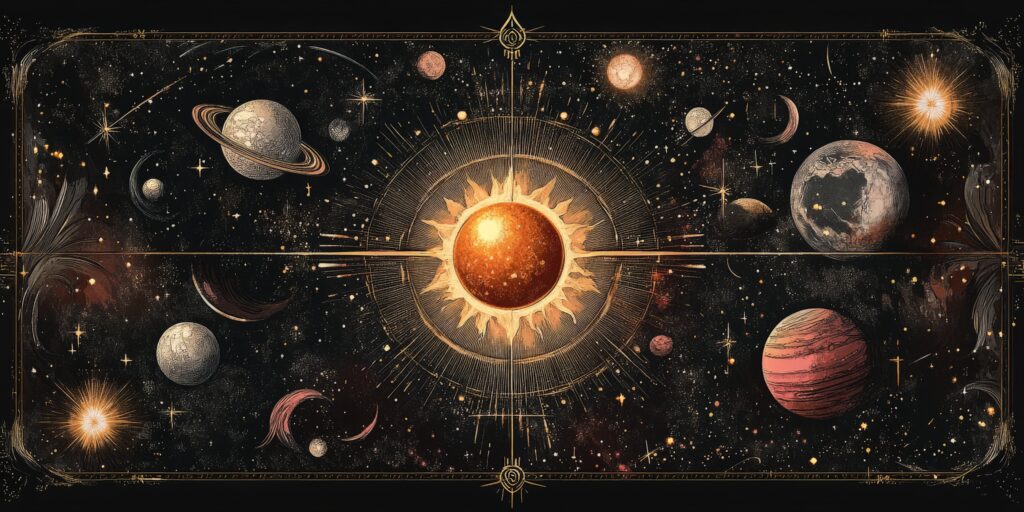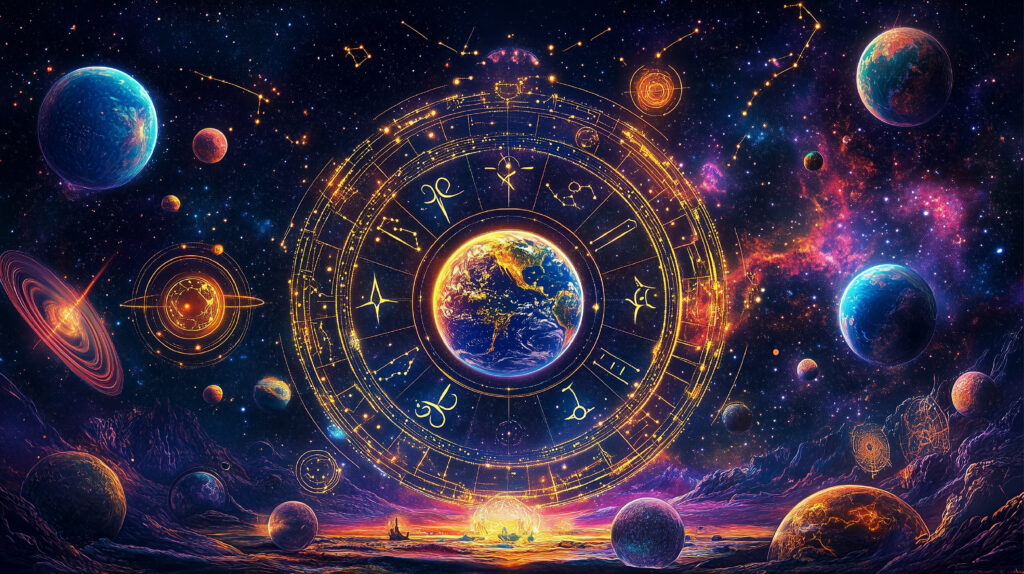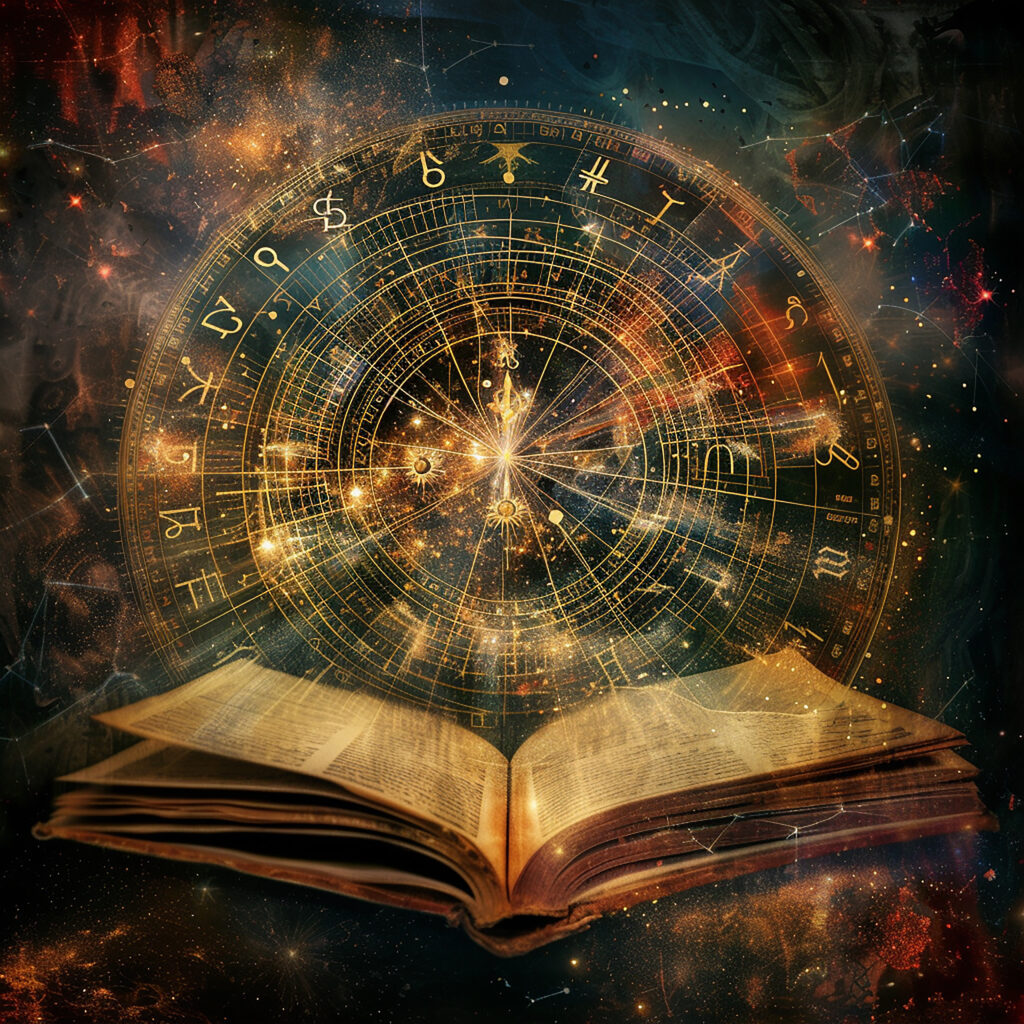Astrology, with its ancient roots, offers symbolic interpretations of celestial events and their influence on human life, distinct from the empirical focus of astronomy. Across traditions like Western and Vedic astrology, it has evolved while maintaining relevance in personal understanding and self-awareness. Despite skepticism, astrology persists, addressing the human need for narrative and meaning beyond what science provides. Today, its practical applications, such as horoscopes and natal charts, continue to offer insights into personality, relationships, and daily guidance, reinforcing its role in personal discovery and cultural narratives.
- Introduction
- Exploring the Foundations of Astrology
- The Evolution of Astrology Through Ages
- Astrology vs. Astronomy: A Modern Understanding
- The Practical Application of Astrological Concepts Today
- Conclusion
- Frequently Asked Questions
- Summary

Exploring the foundations of astrology
Astrology’s allure is rooted in its rich esoteric tradition, offering a perspective on life’s mysteries. Through understanding astrology fundamentals, we can appreciate the intricate relationship between celestial events and human experiences. This section delves into the core principles that underpin the practice of astrology, setting the stage for deeper exploration.
Unveiling astrology’s esoteric roots
Astrology’s inception reaches back to antiquity, emerging from a tapestry of mythological narratives and a desire to divine meaning from the heavens. At its core, this esoteric tradition posits that celestial events wield a cosmic influence over the natural world, including individuals’ lives and destinies. Throughout history, astrology has provided a sense of connection to a larger cosmic order. The significance of astrology today remains evident as it continues to offer personal insights and guidance to its adherents. Deeply intertwined with human psychology and philosophy, astrology’s appeal endures, presenting an alternative way to navigate life’s complexities.
The structure of astrological systems: Western vs. Vedic
Astrological fundamentals are interpreted differently across distinct systems, each with its own unique framework and methodology. Western astrology, rooted in Hellenistic traditions, is organized around the tropical zodiac, accounting for the Sun’s position relative to the equinoxes. Conversely, Vedic astrology—or Jyotish—originates from ancient Indian culture and uses the sidereal zodiac, which aligns with fixed constellations. These systems underscore the evolution of astrology practices, evolving and adapting to the cultural contexts from which they arise. The enduring legacy of both illuminates the continued relevance and adaptability of astrology in modern society.

Astrology’s mechanisms: How planetary positions affect us
The foundations of astrology rest upon the observed impacts of planetary positions and movements on human affairs. Birth chart analysis provides a comprehensive view, often revealing nuanced aspects of one’s personality and potential life path. Astrology fundamentals explained through the lens of these celestial interactions grant us a structure for astrological predictions. Sun signs, moon signs, and rising signs are fundamental components, shaping our individual experiences and behavioral patterns. Understanding your astrological chart becomes an intimate journey into self-awareness, uncovering the layers of influence that the cosmos may hold over one’s existence.
The evolution of astrology through ages
Astrology’s historical development is a testament to its adaptive nature and enduring significance. Its transformation through the ages reflects cultural shifts and advances in human thought. In this section, the dynamic trajectory of astrological practices across different eras is examined, highlighting how astrology has been shaped by, and has shaped, various societies.
Tracing astrology’s transformation over millennia
From ancient Mesopotamian times, where astrology served as a guide for rulers, through its pivotal role in Renaissance intellectualism, astrology’s historical development has been marked by continual adaptation and integration. Spanning cultures and continents, astrology evolved, absorbing philosophical and scientific advancements while retaining its core mystical allure. Astrology in modern society reveals a resilient practice, persistently reinvigorated by contemporary interpretations and digital dissemination. This historical journey enriches our understanding of astrology’s place in the collective psyche across epochs and civilizations.
Astrological practice in the digital Era
With the advent of the digital era, contemporary astrology significance has been amplified through accessibility and innovation. Platforms online provide personalized horoscopes, birth chart analysis, and astrological predictions at the click of a button. The evolution of astrology practices is evident in the way technology has democratized and expanded the reach of this ancient wisdom. Moreover, online communities have fostered spaces for discussion and exchange, solidifying astrology’s presence in the cultural zeitgeist. The synthesis of the ancient art with modern technology illustrates a fascinating chapter in the evolution of astrology practices, one that continues to unfold in our hyper-connected world.
How astrology surmounted social and scientific scrutiny
Despite frequent dismissal as a pseudoscience, astrology has withstood significant social and scientific scrutiny over time. Its survival can be attributed to the deep-seated human tendency to seek patterns and meaning amidst the chaos of existence. Astrology vs astronomy differences have become more pronounced in the modern era, as astronomy’s empirical approach diverges sharply from astrology’s interpretive, symbolic nature. Still, the significance of astrology today rests on its provision of personal meaning and solace—a psychological and spiritual service that empirical science does not fulfill. This resilience highlights a cultural yearning for narrative and reflection, a space where astrology thrives.
Astrology vs. Astronomy: A modern understanding
The distinction between astrology and astronomy has been a point of contention and clarification through the centuries. In contemporary society, it is essential to comprehend the divergent paths these fields have taken. Astrology remains in the domain of personal exploration, while astronomy follows a rigorous scientific method. This section elucidates their historical divergence and current standings.
The origins of astronomy and its divergence from astrology
Astronomy and astrology share a connected past, with the latter once considered a scholarly tradition alongside its observational counterpart. The divergence began during the Enlightenment, as empirical evidence and scientific methodology became paramount in understanding the universe. Astronomy evolved into a rigorous science, dedicated to the exploration and quantification of celestial phenomena. The astrology and astronomical distinction solidified, positioning astronomy as a discipline grounded in objective investigation, and astrology as one of personal interpretation and insight, with the astrology vs astronomy differences becoming a cornerstone of modern scientific discourse.
The science behind astronomy: empirical evidence and exploration
The science of astronomy is propelled by empirical evidence, technological innovation, and exploratory curiosity. The study of celestial objects, from planetary mechanics to cosmic phenomena, relies on a framework of testable and falsifiable theories. Astronomy’s fortitude lies in its ability to detail the mechanics of the cosmos with extraordinary precision, contributing to a deeper understanding of the universe’s fundamental principles. With the aid of advanced telescopes and space missions, astronomy continues to expand the boundaries of human knowledge, starkly contrasting the subjective interpretations characteristic of astrology.
The role of astrology in a scientific world
In a world driven by science and empirical evidence, the role of astrology presents an interesting contrast. As a practice steeped in symbolism and personal resonance, astrology persists despite its classification as a pseudoscience. It fulfills a distinct human desire for connection and comprehension of the self within the cosmos—a dimension science, with its focus on the material world, does not address. The continuing significance of astrology today is thus rooted in its ability to complement the scientific perspective by offering a more subjective, introspective narrative of our place in the universe and our interpersonal dynamics.
The practical application of astrological concepts today
Astrological concepts have practical applications that are both personal and widespread. Understanding the influence of astrology can provide individuals with insights into their own nature and relationships, as well as a broader perspective on navigating life’s challenges. We explore how contemporary astrology manifests in personal life and collective practices.
Zodiac and horoscope: Tools for daily guidance
Horoscopes and zodiac signs serve as familiar tools for countless individuals seeking daily guidance. These practical facets of contemporary astrology draw from the position of the sun at one’s birth, offering general predictions and advice based on sun signs. While skeptics may question the validity of such astrological predictions, many find value in the reflective prompts and personal insights offered. Understanding the basics of astrology unlocks the ability to decode these daily horoscopes, turning them into a source of contemplation and self-motivation for believers navigating the complexities of life.
Deciphering life’s blueprint through natal charts
Natal charts serve as a more personalized and detailed instrument in the realm of astrological charts, mapping the celestial positions at the precise moment of an individual’s birth. These charts offer a deep dive into the intricacies of one’s personality traits, potential life experiences, and growth areas. Understanding your astrological chart can guide you in uncovering latent talents, confronting challenges, and fostering personal development. Birth chart analysis provides a tailored cosmic blueprint, giving each individual a unique astrological narrative to explore and interpret.
The impact of astrological compatibility on human relationships
Astrological compatibility is a compelling aspect of human relationships, where astrological charts are compared to assess harmony and potential challenges. Astrological aspects and houses play a significant role in this analysis, influencing romantic partnerships, friendships, and professional associations. By leveraging this knowledge of astrological compatibility, individuals may gain insights into their interpersonal dynamics, helping them navigate connections more mindfully. Whether or not one fully endorses its accuracy, the intrigue surrounding astrological compatibility reflects a broader fascination with the cosmic influence over our relational worlds, underscoring the timeless appeal of astrology’s insights.

Conclusion
The enduring allure of astrology is underpinned by its capacity to impart individualized insights, fostering an enriched understanding of self and harmonious human connections through astrological compatibility. As we continue to dissect the basics of astrology understanding, the distinction between astrology and astronomy grows starker, yet both fields maintain their unique significance in interpreting our place in the cosmos. The evolution of astrology practices mirrors humanity’s quest for wisdom, revealing astrology’s pivotal role in cultural narratives and personal discovery. In modern society, contemporary astrology significance has been magnified, offering a conduit for personalized guidance via natal charts and daily horoscopes. Understanding your astrological chart is a journey into the esoteric realms—grounded in astrology fundamentals explained against a canvas of celestial events—that captivates those seeking solace in the cosmic influence of planetary positions. As astrology’s historical development continues to intertwine with evolving paradigms, its profound impact on personal philosophy and the collective search for meaning asserts the remarkable legacy of this ancient wisdom in contemporary life.

Frequently Asked Questions (FAQ)
How has the historical development of astrology shaped its contemporary significance in modern society?
The historical development of astrology has been integral to its contemporary significance in modern society. Astrology’s roots stretch back to ancient civilizations, where it was intertwined with cultural and spiritual practices. As it evolved, astrology expanded from the esoteric tradition into a system that attempts to interpret human affairs and natural phenomena based on the movements and positions of celestial bodies. Today, astrology in modern society is frequently perceived as a tool for introspection or entertainment, encapsulated in the wide readership of horoscopes and a growing interest in birth chart analysis. Despite its categorization as a pseudoscience by the scientific community due to its lack of empirical evidence, the significance of astrology today persists, reflected in its popularity and the personal value many individuals place on its insights.
Can you elucidate the basics of astrology understanding for individuals interested in deciphering their natal charts?
To grasp the basics of astrology understanding, individuals seeking to decipher their natal charts should familiarize themselves with the foundational components: sun signs, moon signs, zodiac signs, astrological houses, planetary positions, and astrological aspects. A natal chart, or birth chart, is a celestial snapshot of the sky at the moment of one’s birth. Sun signs signify one’s core identity, while moon signs relate to emotions and inner mood. The zodiac signs represent twelve different archetypes that are said to influence personality traits. Astrological houses in the chart denote different life areas, and the planetary positions within these houses reflect potential life experiences. Lastly, astrological aspects are angles created between planets, suggesting the nature of the interaction between the various cosmic influences.
In what ways have the evolution of astrology practices diversified the interpretations of astrological charts and celestial events?
The evolution of astrology practices has led to a rich diversity in the interpretations of astrological charts and celestial events. Over time, distinct astrological traditions—ranging from Western to Vedic to Chinese astrology—have developed their own unique methodologies and perspectives. This evolution has given rise to new techniques for chart interpretation, such as progressions, transits, and synastry. Each tradition considers different sets of celestial data and cultural contexts that speak to the multifaceted nature of contemporary astrology. Such diversification underscores a deeper, adaptive understanding of astrological predictions and the nuanced ways celestial events are perceived across different societies.
Could you compare the astrological compatibility methods found in Western astrology versus those in Vedic astrology to highlight cultural differences?
Astrological compatibility methods in Western astrology and Vedic astrology are both geared toward examining relationships, yet they underscore distinct cultural differences. In Western astrology, compatibility is often analyzed through synastry, which studies the planetary positions in two individuals’ natal charts and their corresponding astrological aspects. Emphasis is given to sun signs, moon signs, and Venus-Mars interplays to assess compatability. Vedic astrology, also known as Jyotish, employs a complex system known as ‘Kundli Milan’ or ‘Guna Milap’, which examines the compatibility between potential partners based on the position of the moon in respective birth charts and scores the match across various ‘Kutas’ or aspects, each with a specific focus and weightage. Both systems reflect the overarching belief in cosmic influence on personal relationships yet are deeply rooted in their own esoteric foundations.
What are the primary differences between astrology and astronomy, and how does this distinction affect public perception of each field’s contribution to our understanding of cosmic influence?
The primary differences between astrology and astronomy center around their foundational approaches to the cosmos. Astronomy is a scientific discipline that empirically studies celestial bodies, phenomena, and the universe at large, employing rigorous methods for data collection, analysis, and interpretation. Its advancements contribute significantly to our understanding of the universe’s structure, behavior, and the laws of physics that govern it. Conversely, astrology uses celestial events as symbols to derive astrological predictions and insights into human behavior and destiny. Due to its lack of empirical grounding, astrology often garners skepticism and is categorized as a pseudoscience. This astrology vs astronomy differences affect public perception: astronomy is generally respected for its scientific contributions, whereas astrology’s value is often considered personal and subjective rather than broadly informative about cosmic influence.

